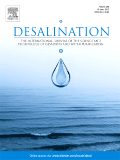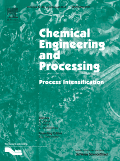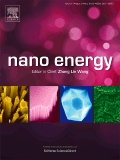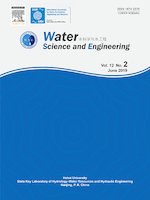
DESALINATION
metrics 2024
Transforming desalination knowledge into impactful solutions.
Introduction
DESALINATION, a leading journal in the field of water science and technology, is published by Elsevier and has been a pivotal resource since its inception in 1966. With its commitment to advancing the disciplines of chemical engineering, materials science, and mechanical engineering, this journal boasts an impressive impact factor, reflecting its esteemed position in category quartiles, as it ranks in the Q1 tier across various fields including Water Science and Technology and Chemical Engineering. Researchers rely on DESALINATION for its cutting-edge studies and comprehensive reviews that address critical challenges in desalination methods and water treatment technologies. Operating in a non-open access format, the journal ensures high-quality peer-reviewed articles are readily accessible to professionals and academics seeking to enhance their understanding of water resources and sustainable practices. Its Scopus rankings place it among the top 10% in multiple applicable domains, making it an essential archive for ongoing research and innovative solutions aimed at addressing global water scarcity.
Metrics 2024
 1.52
1.52 8.30
8.30 8.70
8.70 231
231Metrics History
Rank 2024
Scopus
IF (Web Of Science)
JCI (Web Of Science)
Quartile History
Similar Journals

Water Reuse
Transforming Water Futures, One Drop at a Time.Water Reuse is a pioneering journal dedicated to advancing the field of water science and technology, particularly focusing on innovations in water recycling and reuse strategies. Published by IWA Publishing in the United Kingdom, this journal has quickly established itself as a vital resource for researchers, professionals, and students engaged in sustainable water management practices. With an impressive impact factor and a ranking that places it in the top quartile for both Water Science and Technology and Filtration and Separation, Water Reuse offers an open-access platform that fosters the dissemination of high-quality research. Since its inception in 2021, it has garnered attention for its commitment to addressing critical global challenges related to water scarcity and environmental sustainability. The journal provides a crucial forum for the exchange of knowledge and best practices, contributing significantly to the advancement of water reuse methodologies. By encouraging interdisciplinary collaboration and the publication of pioneering studies, Water Reuse is poised to play a central role in shaping the future of water management.

Chemical Engineering and Processing-Process Intensification
Advancing the Frontiers of Process IntensificationChemical Engineering and Processing - Process Intensification is a leading journal published by Elsevier Science SA, specializing in the multifaceted domain of chemical engineering. With the ISSN 0255-2701 and E-ISSN 1873-3204, this journal stands as a beacon of knowledge, facilitating the dissemination of innovative research from 1984 onwards and continuing through 2024. Renowned for its rigorous peer-review process, it boasts a distinguished reputation, reflected in its top-tier rankings within several fields: Q1 in Chemical Engineering (Miscellaneous), Q2 in Chemistry, and Q1 in Industrial and Manufacturing Engineering. This journal focuses on the advancements in process intensification, which are crucial for optimizing efficiency and sustainability in chemical processes. Although access is not open, the journal serves as an essential resource for researchers, professionals, and students alike who seek to advance their understanding and contribute to the evolving landscape of chemical engineering and process technology. Join a community of innovators driving the future of process engineering through impactful and cutting-edge research.

ENVIRONMENTAL ENGINEERING SCIENCE
Advancing sustainable solutions for a cleaner planet.ENVIRONMENTAL ENGINEERING SCIENCE is a leading journal published by MARY ANN LIEBERT, INC that provides a platform for pioneering research in the fields of environmental chemistry, pollution control, and waste management. With an ISSN of 1092-8758 and an E-ISSN of 1557-9018, this peer-reviewed journal aims to disseminate high-quality scientific studies that address critical environmental challenges. As evidenced by its 2023 category quartile rankings, it holds a notable position at Q3 in Environmental Chemistry and Pollution and Q2 in Waste Management and Disposal, highlighting its relevance and impact in these domains. Spanning over two decades from 1997 to 2024, the journal is dedicated to fostering innovations and promoting rigorous scholarship that can contribute significantly to sustainable environmental practices globally. Authors and researchers are encouraged to engage with this essential resource, which offers Open Access options to enhance the visibility and reach of their work. For those interested in advancing their understanding and practice within the environmental sciences, ENVIRONMENTAL ENGINEERING SCIENCE is an indispensable journal to consider.

Environmental Science-Water Research & Technology
Leading the charge in global water sustainability.Environmental Science-Water Research & Technology is a premier journal published by the Royal Society of Chemistry that focuses on the latest research and technological advancements in the field of water science and engineering. Since its inception in 2015, the journal has steadily gained recognition for its rigorous peer-review process and commitment to advancing our understanding of fresh, wastewater treatment, and sustainable water management. With a remarkable 2023 impact factor and consistently achieving Q1 status in both Environmental Engineering and Water Science and Technology categories, this journal ranks within the top percentile of its field, underscoring its pivotal role in fostering innovative solutions to global water challenges. Currently listed as Rank #26/261 in Water Science and Technology and Rank #34/197 in Environmental Engineering by Scopus, it provides an essential platform for researchers, professionals, and students alike. The journal embraces a broad spectrum of topics concerning water research, aiming to bridge the gap between scientific understanding and practical application.

Water Research X
Pioneering research for a water-secure future.Water Research X is a prestigious journal published by ELSEVIER, focusing on the dynamic fields of water science and technology, pollution, ecological modeling, and waste management. Since its inception in 2018, this Open Access journal has become a cornerstone resource for researchers and professionals dedicated to advancing our understanding and management of water resources. Based in the United Kingdom, Water Research X holds an impressive ranking within the Scopus metrics, positioned in the Q1 category across multiple relevant disciplines, including Environmental Science, with a notable rank of 10/261 in Water Science and Technology and 3/41 in Ecological Modeling. This reflects its commitment to disseminating high-quality research that informs policy, supports sustainable practices, and fosters innovation in water management.

Membranes
Elevating the conversation on membrane advancements.Membranes, published by MDPI since 2011, is an esteemed open access journal dedicated to advancing the field of membrane science and technology. With an E-ISSN of 2077-0375, this journal serves as a vital platform for researchers and professionals from various disciplines such as chemical engineering, filtration, and separation technologies. Holding a commendable Q2 ranking in Chemical Engineering (miscellaneous) and notable placement in filtration and process chemistry categories, it provides a robust framework for researchers to disseminate groundbreaking findings. The journal's commitment to open access ensures a wide-reaching impact, allowing for unrestricted sharing of high-quality research that addresses the critical challenges and innovations in membrane technology. Situated in Switzerland, Membranes is not only a cornerstone for academic inquiry but also a leading resource for students and industry experts seeking cutting-edge developments in their fields.

Water Conservation Science and Engineering
Exploring Interdisciplinary Approaches to Water ManagementWater Conservation Science and Engineering, published by SPRINGERNATURE, is a vital academic journal dedicated to advancing the fields of environmental engineering, ocean engineering, waste management, and water science and technology. Since its inception in 2016, the journal has quickly established itself within the academic community, achieving a commendable Q3 ranking across multiple categories in 2023. With an ISSN of 2366-3340 and an E-ISSN of 2364-5687, it is accessible to a global readership eager to explore the latest research and innovations in water conservation and sustainable practices. Although currently not open access, the journal is committed to publishing high-quality scholarly articles that provide insights into effective water management strategies, innovative engineering solutions, and the critical importance of preserving our water resources. Based in Singapore, Water Conservation Science and Engineering aims to foster interdisciplinary collaboration among researchers, professionals, and students, making it an essential resource for anyone passionate about environmental sustainability and preservation.

Nano Energy
Transforming Energy Landscapes with Cutting-Edge ResearchNano Energy is a premier journal published by Elsevier, focused on the dynamic intersection of nano-technology and energy solutions. Since its inception in 2012, this high-impact journal has made significant strides in advancing research across multiple disciplines, showcasing groundbreaking studies in Electrical and Electronic Engineering, Materials Science, and Renewable Energy. With an impressive Impact Factor that places it in the Q1 category of these fields—including a distinguished rank of #6 in Electrical Engineering and #9 in Renewable Energy on Scopus—the journal serves as a vital resource for academics and practitioners alike. Nano Energy aims to disseminate innovative research and developments that contribute to the sustainable energy landscape, thereby addressing pressing global energy challenges. Researchers and professionals seeking to stay at the forefront of nanotechnology applications in energy generation and efficiency will find this journal an indispensable platform for sharing knowledge and driving impact.

Water Science and Engineering
Connecting Global Minds in Water Science and EngineeringWater Science and Engineering, published by ELSEVIER, is a premier open access journal that has been disseminating vital research in the realms of civil and structural engineering as well as ocean engineering since 2008. With its ISSN 1674-2370 and E-ISSN 2405-8106, this journal plays a crucial role in advancing knowledge and innovation within the sector, evidenced by its impressive rankings in Scopus—holding the 15th position out of 105 in Ocean Engineering and 76th out of 379 in Civil and Structural Engineering, placing it in the 86th and 80th percentiles, respectively. Attaining a Q1 classification in both categories for 2023 highlights its importance and influence in the academic and professional communities. The journal addresses a broad spectrum of topics integral to water sciences, offering significant insights for researchers, professionals, and students alike. With a convergence period spanning from 2010 to 2024, it continues to explore contemporary issues and advancements, providing a pivotal platform for the dissemination of research. The journal is accessible to a global audience, reaffirming its commitment to fostering open access and enhancing accessibility to vital scientific literature.

ACS ES&T Water
Exploring the intersection of chemistry and environmental science.ACS ES&T Water, published by the American Chemical Society, is a leading peer-reviewed journal focused on the interdisciplinary field of water science and technology. Since its inception in 2021, the journal has rapidly established itself as a prominent platform for research, boasting an impressive impact factor and ranking in the Q1 category across various disciplines, including Chemical Engineering, Chemistry, Environmental Chemistry, and Water Science and Technology. With a current Scopus rank of #66 out of 261 in Environmental Science and a remarkable percentile of 74%, ACS ES&T Water is dedicated to advancing the understanding of water-related challenges and solutions through high-quality research. The journal aims to facilitate communication among researchers, professionals, and policymakers by providing open access to innovative studies and methodologies that address critical issues in water resource management and sustainability. Collaborating at the intersection of chemistry and environmental science, this journal is essential for anyone invested in the future of global water security and innovation.